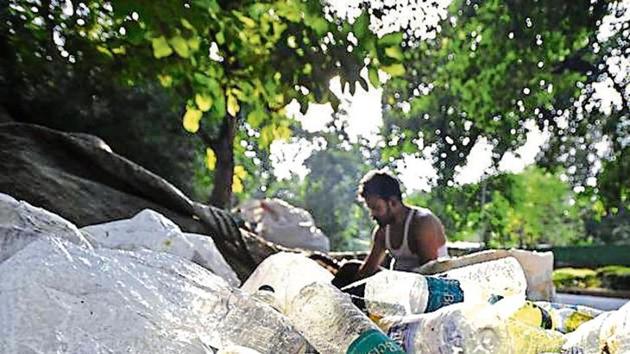Single-use plastic definition in offing/draft ready
Globally, plastic pollution has stoked an unmitigated crisis, from choking seas to rivers and landfills.
India is readying its own definition of “single-use plastic”, like 65 other countries are, so as to effectively implement a larger campaign launched by Prime Minister Narendra Modi to rid the country of disposable plastics by 2022.

A committee led by the Union chemicals and fertilizers ministry has completed a draft report on what ought to fall under the category of single-use plastic. The report, which goes beyond items of daily use to arrive at a technical definition which also incorporates articles of industrial use, will be publicised for suggestions and review by stakeholders, an official with knowledge of the matter said.
Globally, plastic pollution has stoked an unmitigated crisis, from choking seas to rivers and landfills. According to official estimates, 9.4 million tonne of the 14 million tonne of plastic produced in India is said to be single-use plastic.
According to the official cited above, the panel has largely relied on the UN’s framework on defining and managing single-use plastic use. According to the United Nations Environment Programme: “Single-use plastics, often also referred to as disposable plastics, are commonly used for plastic packaging, and include, items intended to be used only once before, they are thrown away or recycled. These include, among other items, grocery bags, food packaging, bottles, straws, containers, cups and cutlery.”
The government is of the view that a public-policy framework must have a statutory definition of single-use plastic, although common daily use items, such as shampoo sachets, plastic cutlery, straws and cups are popularly referred to as single-use plastic items.
However, not all single-use plastics are used by retail consumers alone. Many articles are of intermediate use, or in other words, go into the production of a final product. Polystyrene or thermocol, for instance, is an intermediate plastic used as insulation material in many appliances. Polystyrene is also used as an end product, such as plastic cutlery and in packaging.
A legal definition of single-use plastic will aid a critical function: it will help to categorise items according to both their “qualitative aspects”, “quantitative aspects” as well as “technical attributes”, the official said.
By a simple qualitative definition, any plastic item designed to be used once and then immediately discarded is single-use plastic. However, without detailed technical classifications, it will be difficult to achieve the larger goal of curbing plastic pollution, according to the official.
Key yardsticks for the panel were a baseline study of items with lowest recyclability, polymers that go into their manufacturing, highest versus lowest utility, and availability of alternatives, the official added.
Experts agree with this approach.
“Quantitative and technical attributes are critical because those alone can help policymakers to pick single-use plastics that have maximum utility and minimum impact or vice versa,” said Raghunath Anant Mashelkar, national research professor and the former chief of the Council of Scientific and Industrial Research (CSIR).
The government first approached Mashelkar in February to oversee the panel that is working on the definition, but he opted out because he offers professional advice to a plastic manufacturer, he said.
The department of chemicals, under the “allocation of business rules 1962”, deals with “broad subject matters on entries relating to petrochemicals, plastic, including fabrication of plastic and moulded goods and planning, development and assistance to all industries dealt by the department”, according to a department note that formed the definition-fixing panel.
“Therefore, keeping in view the subjects allocated, the department of chemicals and petrochemicals constituted an expert committee to define the single use plastics,” the note state.
The panel has gone into environmental impact assessments and assessed usage patterns and volumes.
Plastics do have substantial economic benefits, but their impact on environment needs clear quantifiable indices. For example, small packages, such as shampoo sachets, allow companies to make affordable packets aimed at the relatively poor. “The key is to define utility versus impact,” Mashelkar said.
According to the UN, since the 1950s, the production of plastic has “outpaced that of almost every other material”.
Get Current Updates on India News, Lok Sabha Election 2024 live, Infosys Q4 Results Live, Elections 2024, Election 2024 Date along with Latest News and Top Headlines from India and around the world.




